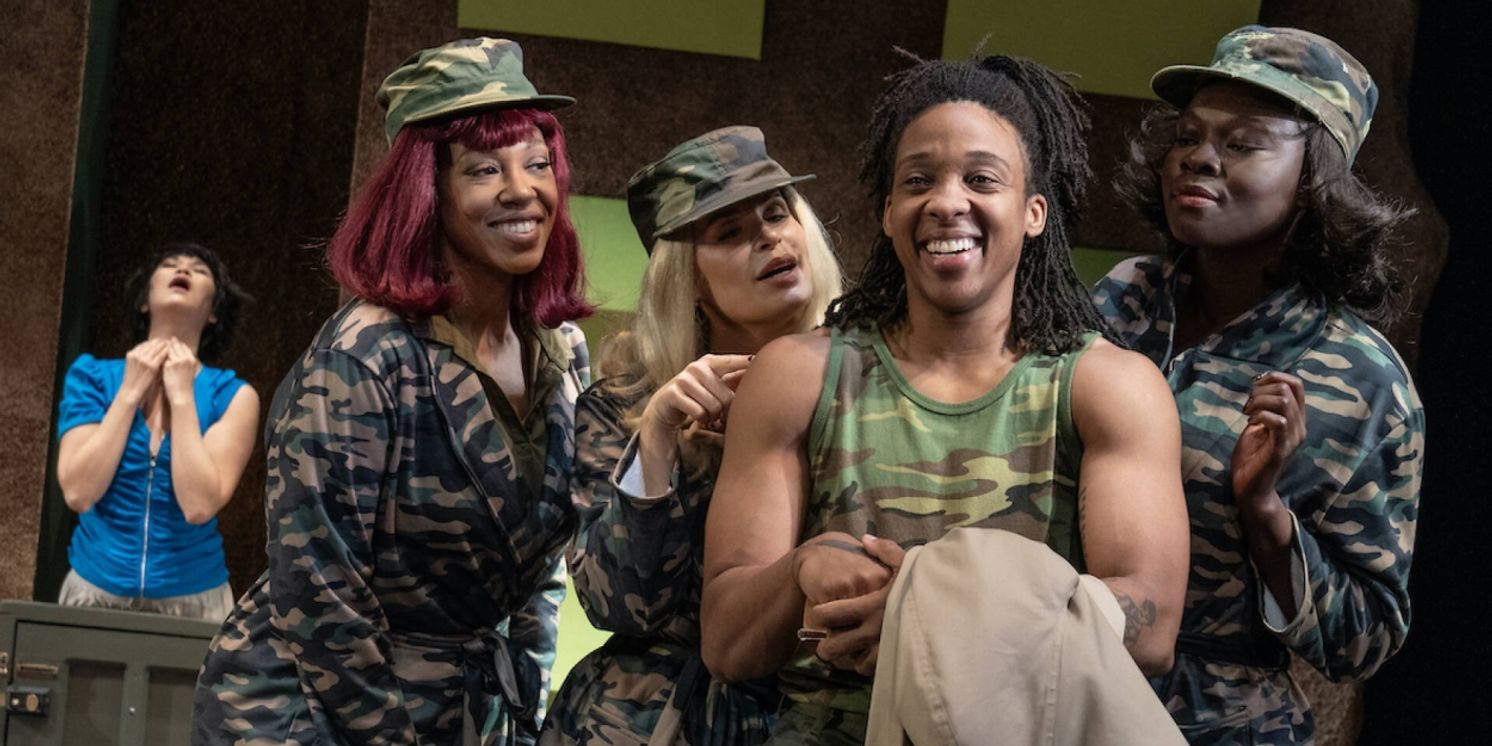Review Roundup: Hansol Jung's MERRY ME at NYTW
Merry Me will run through November 19, 2023 at New York Theatre Workshop.

New York Theatre Workshop just celebrated opening night of Merry Me by 2050 Artistic Fellow & NYTW Usual Suspect Hansol Jung (Wolf Play), directed by NYTW Usual Suspect and Tony Award nominee Leigh Silverman (Hurricane Diane). Merry Me will run through November 19, 2023.
The cast of Merry Me includes Marinda Anderson (You Will Get Sick), Cindy Cheung (Catch as Catch Can), Esco Jouléy(Wolf Play), David Ryan Smith (Candida), Ryan Spahn (Good Enemy), Nicole Villamil (Wolf Play) and Shaunette RenéeWilson (“The Resident”).
Merry Me is an intoxicating queer cocktail of restoration comedy and the Greeks, served with a heavy garnish of ridiculous. On an island not far away from the vulnerable coasts of the enemy state, a mysterious blackout has left the Navy restless and itching for action. Lieutenant Shane Horne has occupied her time satisfying the libidinous needs of all the women on the base—including the jealous general’s wife. But her own merries will not... come. Meanwhile a famed Angel re-descends to amend her previous prophesy, sending the Navy’s psychiatrist on an epic quest to save humanity. Will the general discover the affair? Will the earth be saved? Will they ever be merry enough?
Let's see what the critics had to say...
Regina Robbins, Time Out: Despite all these blasts from the past—the works of Shakespeare and Virginia Woolf also make appearances—Merry Me lives very much in the present, and marks a stark departure from much of Jung’s previous work, which has focused on characters immobilized by trauma. Director Leigh Silverman, a frequent collaborator, fully embraces Jung’s ode to sexual ecstasy, as does the cast, capering to and fro on Rachel Hauck’s candy-colored set. Because the sexuality on display is primarily queer, the play has an inherently political element, but we’re not here to get our consciousness raised; we’re here to bear witness to women unashamed of their desires and determined to satisfy them—and maybe to see some white men get vaporized like in Avengers: Infinity War. Merry, indeed! The great work begins.
Sara Holdren, Vulture: Hansol Jung’s Merry Me is a self-described lesbian sex comedy — with marketing full of eggplant and peach emoji — developed by Jung and director Leigh Silverman in the years since their 2018 collaboration Wild Goose Dreams. Busting out of its trousers with sources, the play riffs on Restoration comedy (specifically William Wycherley’s The Country Wife), Greek drama and poetry (Sappho, of course), Shakespeare, Tony Kushner, David Bowie, Melissa Etheridge, even Our Town. Jung is a writer who loves burbling, semi-chaotic language — in Wild Goose Dreams, she turned the internet into a chattering human chorus — and Merry Me often has the feeling of an overfilled Champagne flute: It’s a giddy cascade of bubbles, and it gives all the signals of being a saucy, silly good time.
David Finkle, New York Stage Review: To their credit, all seven actors perform as if they whole-heartedly believe in what they’re doing. The same goes for costume designer Alejo Vietti, lighting designer Barbara Samuels, sound designers Caroline Eng and Kate Marvin, and intimacy coordinator Rocio Mendez, who’s staying very busy these sexually liberated theater days. So, when all is said and done, is Merry Me a jes or a no? Jes, it’s a no.
Amelia Merrill, New York Theatre Guide: Jung remains the master of wordplay, delighting with dialogue jam-packed with references and jokes; as fun as it is to watch Merry Me, it will be even better to read the script when published. She also showcases her versatility in a stark departure from the sober Wolf Play and Wild Goose Dreams, depicting homophobia as a niche joke that poses more laughter than threats. More serious moments feel a bit lacking, such as a too-lengthy monologue by Sapph near the end of the show, and repeated on-the-nose social commentaries falter. These moments are infrequent, however, and are drowned out by the raucous laughter of an audience being served a blend of physical comedy, dry observational humor, and inside jokes about queer theatre.
- To read more reviews, click here!
- Discuss the show on the BroadwayWorld Forum
Reader Reviews

Videos

